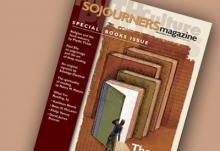Bible
"In my chest full of flowers, Flowering wholly and only for Him, There He remained sleeping; I cared for Him there, And the fan of the high cedars cooled Him." In Dark Night of the Soul, St. John of the Cross recalls the tenderness with which he cared for God. Clearly, he knew not only how to welcome God, but how to treat God as beloved. His experience is echoed this month in the numerous ways the faithful have welcomed and cared for the Holy One: Abraham welcomes God as guest and dialogue partner; the disciple Mary welcomes God as teacher, and Jesus teaches us to welcome God first as an enemy in need, and then as "Abba," our beloved dad. This Abba is not a remote, distant father but a devoted parent who cares for us with a mother's tenderness: "As a mother comforts her child, so I will comfort you...your heart shall rejoice; your bodies shall flourish like the grass" (Isaiah 66:13-14).
In a world filled with overwhelming suffering and persistent injustice, the work of discipleship can easily become life-draining instead of life-giving. Discipleship can become a burden that prevents us from recognizing the most important thing: the presence of God with us, and loving this Abba as we are first loved - with all our hearts and souls. When we, like St. John, not only welcome but cherish God's presence, whether in the stranger, enemy, or friend, we are comforted so that our hearts shall rejoice, and our work of discipleship shall flourish.
"We must re-vision Christian faith as a combative, argumentative, and emancipatory" practice that seeks "the well-being of all."
Our churches have attempted to corner the market on grace, to act as society's sole dispensers of salvation.
Only when we know ourselves as broken yet fiercely loved can we share the gift of new life.
Artist Barry Moser's new illustrated Bible shows that the people of scripture---and books themselves---are very much alive.
People in the ancient world were very careful about how they approached their gods.
There’s this terminally hip bar, I can’t remember the name, and I’m drinking too much gin, smoking cigarettes that don’t belong to me, and—here’s my confession—reading aloud from The Gospel According to John. Those I’m reading to, they’re friends mostly, and friends of friends, and I doubt a single one of them believes any more than I do in God-the-Almighty, let alone in Jesus Christ. A blond girl named Lauren takes the book away from me, but only so she can read for herself. "It’s almost Ginsberg," she sighs.
I’ve been carrying John in my coat pocket all week, ever since it came in the mail from Grove Press, along with the three remaining gospels, Genesis, Exodus, and six more installments of the Bible, each individually bound in slick trade paperback. There was a press release, too. "The most radical approach to the Bible since Gutenberg," it said. And in that terminally hip bar, listening to Lauren read John 20:11, I begin to believe the hype.
They’re called Pocket Canons, and they’re priced at $2.95 apiece. Each one has a celebrity introduction, followed by the King James text, from which not a single thy, thou, or thine has been omitted. They’re slimmer than a Palm Pilot, and not much bigger all around. In England, nearly a million copies have sold.
Even the planned first U.S. printing of 600,000 should be enough to put a Canon in the pocket of every post-ironic street cynic from Manhattan to San Francisco. The most radical approach since Gutenberg: If infidels like Lauren start reading the Bible, if this Jesus character catches on the way that, say, Harry Potter has, humanity’s greatest work of literature—the cornerstone of Western culture and of Judeo-Christian morality—may just be freed from the hands of bigotry.
Our religious traditions teach that human beings need time for self-reflective spiritual growth, for loving family, and for communal sharing. And the earth itself needs time to rest. Yet today's high-stress, environmentally toxic economy and culture preclude this sort of spiritual deepening.
Indeed, most Americans today work longer, harder, and more according to someone else's schedule than they did 30 years ago. We have less time to raise children, share neighborhood concerns, or develop our spiritual life. This unremitting addiction to "doing" and "making" has intensified many forms of pollution of the earth. This life situation crosses what we usually see as class lines: Single mothers who are working at minimum wages for fast-food chains and holding on by their fingernails to a second job to make ends meet feel desperately overworked; and so do wealthy brain surgeons.
Why is this happening? Because doing, making, profiting, producing, and consuming have been elevated to idols. While corporate profits have zoomed and the concentration of wealth has increased, real wages have remained stagnant for 20 years, and the pressure has intensified to work harder and longer just to stay in the same place.
Biblical "shabbat" is a critique of these idolatries.
Shabbat—the Sabbath—appears first as a cosmic truth in the creation story (Genesis 2:1-4), but seems to have had no effect on human life till just after the great liberation of the Israelites from slavery. In Exodus (16:4-30) Shabbat is made known, along with the manna in the wilderness. This story of food and rest echoes and reverses the tale of Eden.
